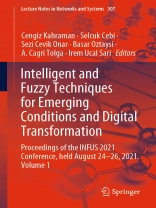This book presents recent research in intelligent and fuzzy techniques. Emerging conditions such as pandemic, wars, natural disasters and various high technologies force people for significant changes in business and social life. The adoption of digital technologies to transform services or businesses, through replacing non-digital or manual processes with digital processes or replacing older digital technology with newer digital technologies through intelligent systems is the main scope of this book. It focuses on revealing the reflection of digital transformation in our business and social life under emerging conditions through intelligent and fuzzy systems. The latest intelligent and fuzzy methods and techniques on digital transformation are introduced by theory and applications. The intended readers are intelligent and fuzzy systems researchers, lecturers, M.Sc. and Ph.D. students studying digital transformation. Usage of ordinary fuzzy sets and their extensions, heuristics andmetaheuristics from optimization to machine learning, from quality management to risk management makes the book an excellent source for researchers.
Jadual kandungan
Fuzzy Clustering.- A Digital Twin-based Approach for the Fault Diagnosis of a Bearing.- Fuzzy Cluster analysis of Claustrophobia questionnaire data in Iranian male and female educated populations.- Data Driven Approach to Order Picking Time Prediction Using Fuzzy Clustering and ANN.- A Comparative Analysis of Fuzzy C-Means, K-Means, and K-Medoids Clustering Algorithms for Analysis Countries’ COVID-19 Risk.- Text Segmentation Using Light Syntax Parsing and Fuzzy Systems.- A Neighborhood Merging Policy Based on Shannon’s Entropy and Symmetric Relative Entropy for Non-Convex Cluster Detection.












